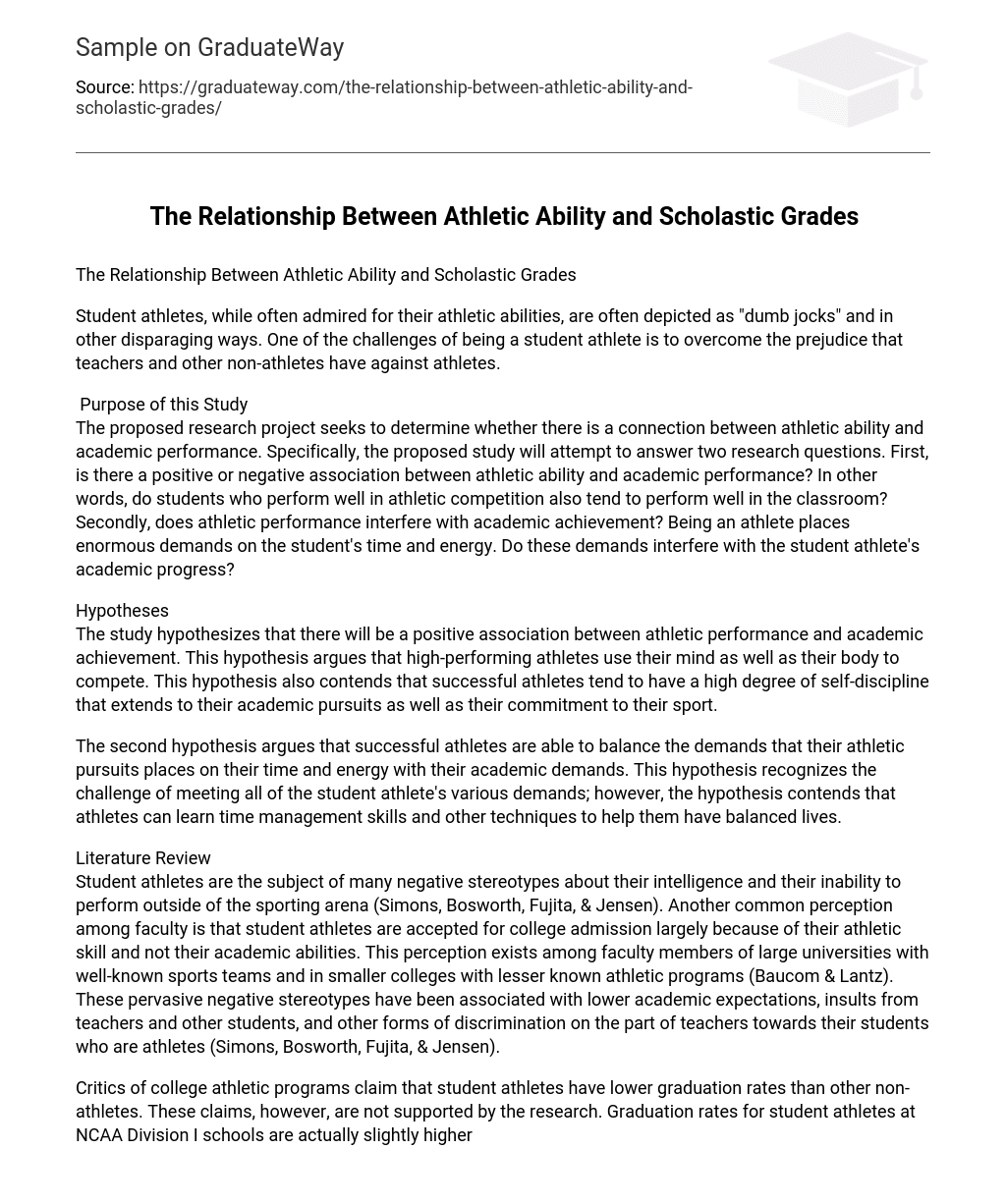Student athletes, while often admired for their athletic abilities, are often depicted as “dumb jocks” and in other disparaging ways. One of the challenges of being a student athlete is to overcome the prejudice that teachers and other non-athletes have against athletes.
Purpose of this Study
The proposed research project seeks to determine whether there is a connection between athletic ability and academic performance. Specifically, the proposed study will attempt to answer two research questions. First, is there a positive or negative association between athletic ability and academic performance? In other words, do students who perform well in athletic competition also tend to perform well in the classroom? Secondly, does athletic performance interfere with academic achievement? Being an athlete places enormous demands on the student’s time and energy. Do these demands interfere with the student athlete’s academic progress?
Hypotheses
The study hypothesizes that there will be a positive association between athletic performance and academic achievement. This hypothesis argues that high-performing athletes use their mind as well as their body to compete. This hypothesis also contends that successful athletes tend to have a high degree of self-discipline that extends to their academic pursuits as well as their commitment to their sport.
The second hypothesis argues that successful athletes are able to balance the demands that their athletic pursuits places on their time and energy with their academic demands. This hypothesis recognizes the challenge of meeting all of the student athlete’s various demands; however, the hypothesis contends that athletes can learn time management skills and other techniques to help them have balanced lives.
Literature Review
Student athletes are the subject of many negative stereotypes about their intelligence and their inability to perform outside of the sporting arena (Simons, Bosworth, Fujita, ; Jensen). Another common perception among faculty is that student athletes are accepted for college admission largely because of their athletic skill and not their academic abilities. This perception exists among faculty members of large universities with well-known sports teams and in smaller colleges with lesser known athletic programs (Baucom ; Lantz). These pervasive negative stereotypes have been associated with lower academic expectations, insults from teachers and other students, and other forms of discrimination on the part of teachers towards their students who are athletes (Simons, Bosworth, Fujita, ; Jensen).
Critics of college athletic programs claim that student athletes have lower graduation rates than other non-athletes. These claims, however, are not supported by the research. Graduation rates for student athletes at NCAA Division I schools are actually slightly higher for student athletes than for non-athletes, with a 63% graduation rate for student athletes and a 62% graduation rate for non-athletes (National Collegiate Athletics Association [NCAA], 16). For African American athletes, the graduation rate was 53% compared to 46% for non-athletes; white athletes had a graduation rate of 67% compared to a rate of 64% for white non-athletes (NCAA, 16). Graduation rates may not reflect a student’s performance in an individual class, but graduation rates are on indicator of the overall success of the student.
Student athletes are often accused of being unprepared or unqualified for college classes. The finding by Aries, McCarthy, Salovey, and Banaji (596) that high-performance athletes at highly selective colleges had lower SAT scores than non-athletes might seem to support this belief. Aries, et al., also found that athletes rated themselves as less intelligent and less creative than their non-athletic peers (Aries, et al., 597). However, despite their SAT scores and their self-perceived academic deficits of athletes, the academic performance of student athletes was consistent with the performance of same gender, same race non-athletes with comparable SAT scores (Aries, et al., 592). Finally, Aries, et al., found that student athletes tended to associate with other student athletes within a closed subculture on campus and were less likely to engage in non-athletic extracurricular activities and social events in which they might interact with non-athletes. This separation may help to explain the perpetuation of student athletes being different from other students.
Most of the research about student athletes has involved NCAA Division I schools. Many athletes, however, attend community colleges or other schools that are not in the Division I classification. While one study found that student athletes had lower GPAs than non-athletes, the same study also discovered that non-transfer athletes at NCAA Division III schools had higher GPAs and higher graduation rates than non-athletes (Robst & Keil, 547). Robst and Keil (548) concluded that participation in athletics in smaller, Division III schools did not have an adverse effect on student academic performance or graduation rates.
Summary
The academic performance of student athletes has been investigated by sports organizations, universities, and other interested researchers. The proposed study seeks to add to this existing body of work and to show that athletic participation is not a detriment to academic success.
Works Cited
Aries, Elizabeth, Danielle McCarthy, Peter Salovey, and Mahzarin Banaji. “A Comparison of Athletes and Non-athletes at Highly Selective Colleges: Academic Performance and Personal Development. Research in Higher Education 45.6 (2004): 577-602.
National College Athletics Association. NCAA Research Related to Graduation Rates of Division I Student-Athletes 1984-2000. October 2007. Online. 29 March 2008 <http://www2.ncaa.org/portal/academics_and_athletes/education_and_research/academic_reform/grad_rate/2007/d1_summary.pdf>
Robst, John and Jack Keil. “The Relationship Between Athletic Participation and Academic Performance: Evidence from NCAA Division III. Applied Economics, 32.5 (15 April 2000): 547-558.
Simons, Herbert D., Corey Bosworth, Scott Fujita, and Mark Jensen. “The Athlete Stigma in Higher Education.” College Student Journal 41.2 (2007): 251-273.





